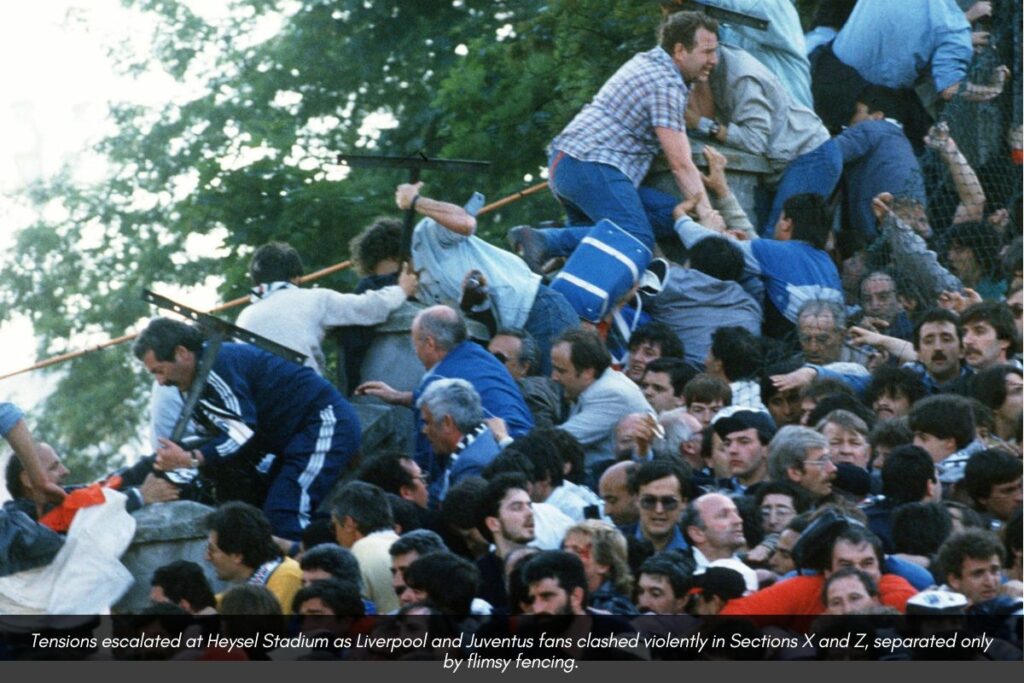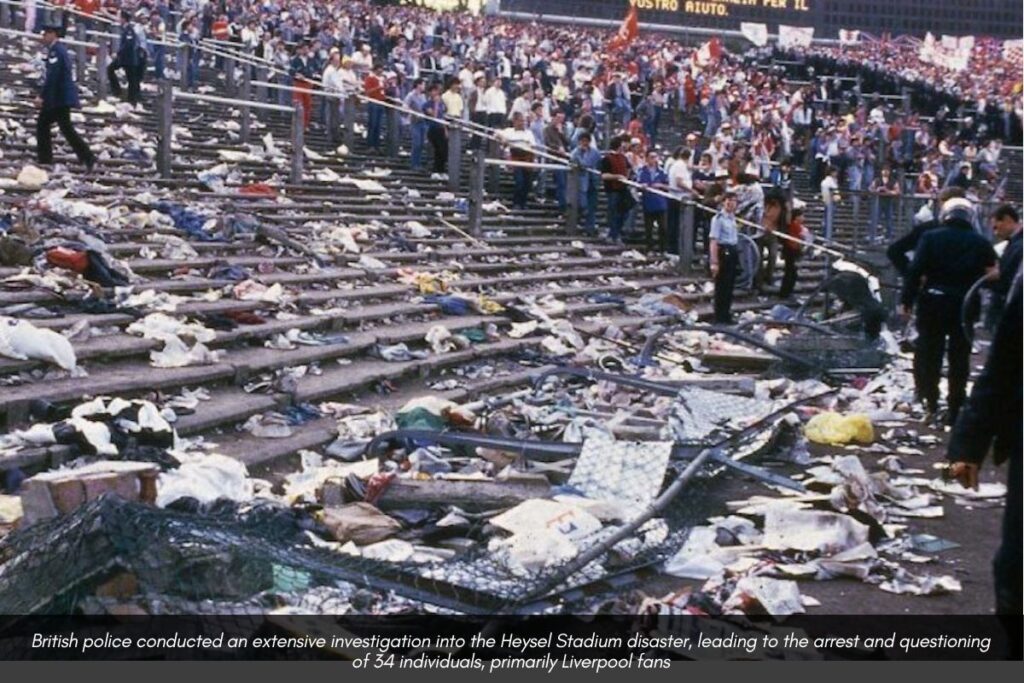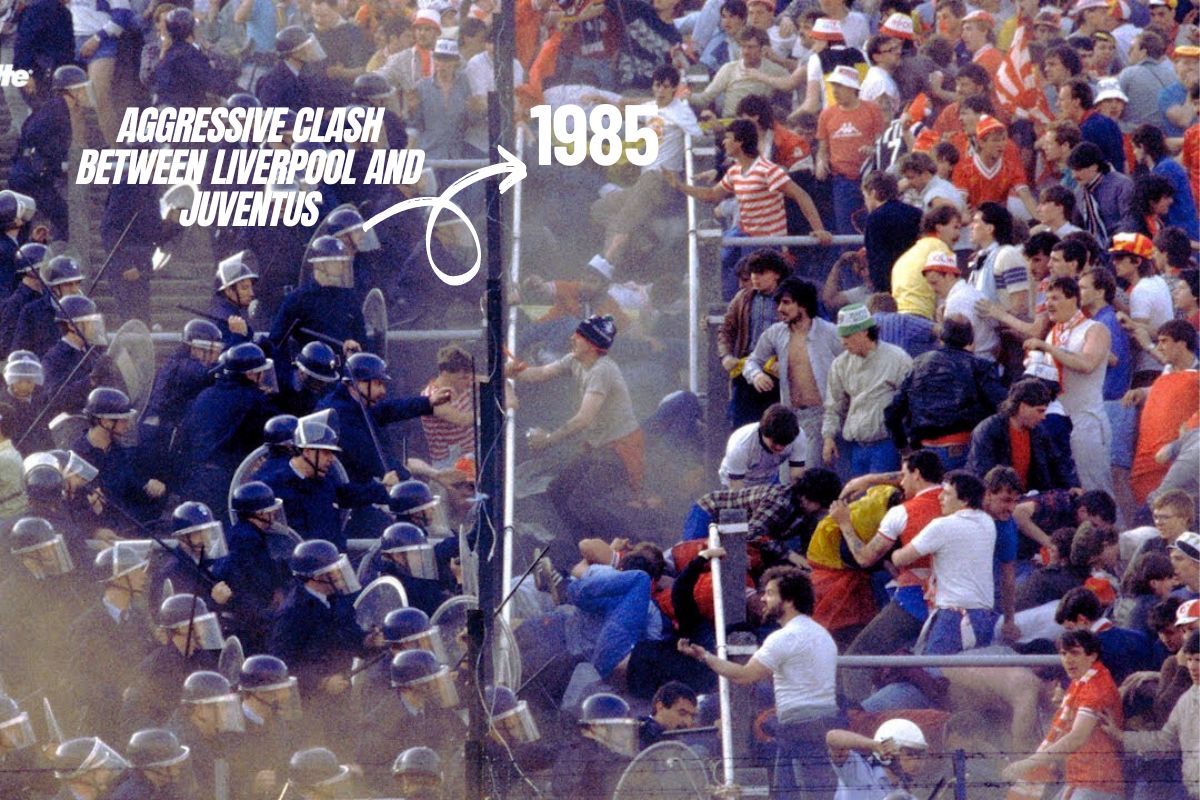The Heysel Stadium disaster occurred on May 29, 1985, during the European Cup final between Liverpool and Juventus in Brussels, Belgium. Unlike Hillsborough, where crowd congestion led to fatalities, Heysel saw a tragic outcome due to fan violence and a collapsed wall. In this article, we’ll delve into the events of the Heysel Stadium disaster, examining its causes, consequences, and the impact it had on football. We’ll also explore the aftermath, including the legal proceedings and changes in stadium safety regulations. Join us as we unravel the complexities surrounding one of football’s darkest moments.
Liverpool and Juventus Fans Clash
Unlike the Hillsborough disaster, where crowd congestion was the primary issue, Heysel witnessed aggressive clashes between supporters, leading to the deaths of 39 individuals, mostly Italians and Juventus fans, with 600 others injured. The stadium’s poor maintenance and failed inspections before the event exacerbated the situation. Tensions between Liverpool and Juventus fans escalated, resulting in chaos and tragedy. Despite the pre-match incidents, authorities controversially allowed the game to proceed, with Juventus ultimately winning 1-0. The aftermath saw severe repercussions for English football clubs, with UEFA imposing an indefinite ban on their participation in European competitions. Liverpool faced additional exclusion for two years, later reduced to one. Legal proceedings resulted in manslaughter convictions for 14 Liverpool fans.

Tensions escalated at Heysel Stadium as Liverpool and Juventus fans clashed violently in Sections X and Z, separated only by flimsy fencing. The situation deteriorated as flares, bottles, and stones were hurled across the divide. With kickoff approaching, the chaos intensified, leading to a surge of Liverpool fans towards Juventus supporters. Overwhelmed police were unable to prevent the breach, resulting in a stampede towards the perimeter wall of Section Z. As fans were crushed against the wall, it collapsed, causing numerous fatalities and injuries. Retaliatory actions ensued, with Juventus fans engaging in further clashes with police, exacerbating the tragedy.
The Game
Despite the Heysel Stadium disaster, the decision was made to proceed with the match for public policy doctrine reasons, fearing that abandoning the game could provoke further disturbances. This choice was made collectively by UEFA officials, national football associations, government officials, and law enforcement, despite Juventus’ plea for the match to be called off. After both team captains appealed for calm, the players took to the field, aware of the tragic loss of lives.
In hindsight, Liverpool captain Phil Neal acknowledged that calling off the game would have been a better decision. Nevertheless, the match went ahead, with Juventus ultimately winning 1-0, courtesy of a penalty scored by Michel Platini. Following the match, the trophy was awarded amidst chants from fans and a chaotic scene as journalists and supporters flooded the pitch. Some Juventus players celebrated in front of their fans, while Liverpool players applauded theirs, unaware of the full extent of the tragedy until they encountered Juventus supporters surrounding their bus. Police escorted the Liverpool team out of the area, allowing them to depart from Brussels Airport safely.
The Probe of the Heysel Stadium Disaster
The investigation into the Heysel Stadium disaster initially pointed blame at the Liverpool fans, with UEFA and Belgian authorities emphasizing their responsibility. Despite a lengthy investigation led by Belgian judge Marina Coppieters, the final dossier placed sole blame on Liverpool supporters. This led to significant changes in stadium safety and crowd control measures, not just in England but across Europe. In England, stricter rules were imposed to prevent troublemakers from attending matches, including legal provisions for exclusion and the introduction of the Football (Disorder) Act 2000.

Heysel Stadium underwent significant reconstruction and was eventually reopened as the King Baudouin Stadium, hosting major football events once again, albeit with a renewed focus on safety and security protocols. British police conducted an extensive investigation into the Heysel Stadium disaster, leading to the arrest and questioning of 34 individuals, primarily Liverpool fans. Eventually, 26 fans were charged with manslaughter and extradited to Belgium to stand trial. The trial began in October 1988, with additional defendants, including officials from the Belgian Football Association and local police chiefs, also facing charges.
In April 1989, fourteen fans were convicted, while others were acquitted in connection with the Heysel Stadium disaster. The trial highlighted the international legal repercussions of football-related violence and underscored the need for improved security measures and crowd control protocols at sporting events.
English Clubs Banned From Europe After the Heysel Stadium Disaster?
English clubs were banned from European competition in 1985 following the Heysel Stadium disaster, where people died during a riot involving Liverpool fans at the European Cup final. Pressure from British Prime Minister Margaret Thatcher led to calls for English clubs to be withdrawn from European competition before they were banned. UEFA subsequently banned English clubs indefinitely, later extending the ban to all worldwide matches. FIFA initially imposed a ban on friendly matches outside of Europe, later allowing them. The ban on English clubs was eventually lifted in April 1990, with Liverpool subject to an additional year of suspension.
The ban stemmed from concerns over crowd safety and hooliganism, prompting the need for stricter regulations and improved security measures at football events. Some of the banned clubs included Everton, Manchester United, Coventry City and Wimbledon. The ban on English clubs from European competition in 1985 had a lasting impact on UEFA Cup qualifications for English teams. Due to a weak coefficient, several English clubs, including Nottingham Forest, Tottenham Hotspur, and Arsenal, missed out on UEFA Cup places in subsequent seasons. The repercussions extended into the 1990s, with teams like Sheffield Wednesday and Crystal Palace also missing out on UEFA Cup qualification.
Even after the ban was lifted, England’s UEFA coefficient remained affected, resulting in continued challenges for English clubs to secure UEFA Cup berths. The restructuring of UEFA competitions in 1999 eventually eased the situation for English clubs, but the ban had dealt a significant blow to their European aspirations.
Conclusion
The Heysel Stadium disaster left an indelible mark on the footballing world, prompting numerous commemorations and memorials in remembrance of the 39 victims. From memorial sculptures at the stadium to permanent plaques at Anfield and Juventus headquarters, the tragedy continues to be honored and remembered by fans, players, and officials alike. Despite the passage of time, the events of that fateful night serve as a poignant reminder of the importance of safety, respect, and friendship in the world of football. As the football community continues to pay tribute to the victims, their memory lives on, ensuring that the lessons learned from the Heysel Stadium disaster are never forgotten.
Read all other posts on Heysel Stadium Disaster
Find the Latest News on Player Ratings | Transfers | Prematch | Postmatch
Stay tuned for more updates on Liverpool FC Times and Stories. Your thoughts are always welcome in the comments section. Thank you for your continued support!
YNWA (You’ll Never Walk Alone)!
The Liverpool FC Times Team
LiverpoolFCTimes.com
